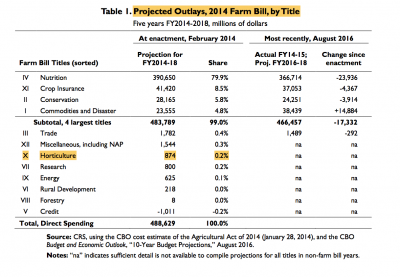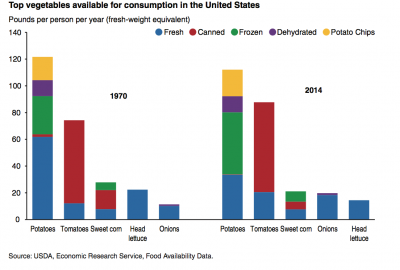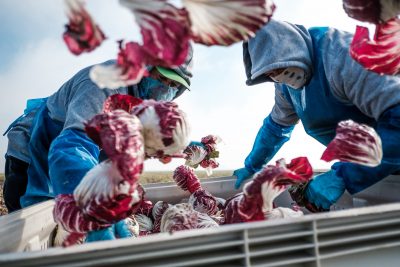The House Agriculture Committee unveiled a draft farm bill Friday that would revamp a key international food aid program, boost risk management options for specialty crop growers and nullify California's…
House Ag Subcommittee Hearing: Specialty Crops
A news release from the House Agriculture Committee on Thursday indicated that, “[T]he Subcommittee on Biotechnology, Horticulture, and Research, held a hearing to evaluate the effectiveness of the 2014 Farm Bill programs aimed at benefiting specialty crop production.” The meeting was part of the Committee’s ongoing series of hearings that are setting the stage for the next farm bill. Although not under the Committees’s jurisdiction, immigration and labor issues were also highlighted.
Specialty Crops: General Background
Subcommittee Chairman Rodney Davis (R., Il.) explained on Thursday that, “At the time of the most recent agriculture census in 2012, the value of farm-level specialty crop production totaled nearly $60 billion, representing about one-fourth of the value of U.S. crop production.
The sheer diversity of the category, ranging from fruits and vegetables, to tree nuts, nursery crops, and floriculture, makes the task of developing specialty crop policies particularly challenging.
Chairman Davis added that, “[W]e have made significant strides over the past several years in expanding crop insurance coverage to a variety of specialty crops.”
Crop insurance for specialty crops has grown, from Thomas P. Zacharias @USCropInsurance presentation at @usda outlook forum last week pic.twitter.com/OxJC31Da2V
— Farm Policy (@FarmPolicy) February 28, 2017
Subcommittee Ranking Member Michelle Lujan Grisham (D., N.M.) pointed out in her opening remarks that, “As I read today’s testimony, I am struck by the extraordinary diversity of your businesses in both products, practices, and size. You grow at the level of tens of acres, hundreds of acres, and thousands of acres producing as wide variety of crops as apples, oranges, carrots, bell peppers, lettuce, grapes, and of course, New Mexican chile.”
Ranking Member Grisham added that, “Our job in Congress is to assist and promote what you do as producers, and I look forward to working with the Chairman, as we write a new farm bill, to provide you with the tools so that you can invest in your businesses, research new technology to improve yields, improve pest resistance and plant health, and find new markets for your crops both domestically internationally.”

A recent Congressional Research Service report provided (“What is the Farm Bill?“) this helpful background on specialty crop provisions in the 2014 Farm Bill: “The bill provides increased funding for several key programs that benefit specialty crop producers. These include the Specialty Crop Block Grant Program, plant pest and disease programs, USDA’s Market News for specialty crops, the Specialty Crop Research Initiative (SCRI), and the Fresh Fruit and Vegetable Program (Snack Program) and Section 32 purchases for fruits and vegetables under the Nutrition title.”

With respect to specialty crops available for consumption, with a more specific look at vegetables, Jeanine Bentley indicated in an Economic Research Service report from last month (“U.S. Trends in Food Availability and a Dietary Assessment of Loss-Adjusted Food Availability, 1970-2014“) that, “Potatoes and tomatoes contributed the largest percentage share for vegetable availability between 1970 and 2014– 112.1 pounds (29 percent) of potatoes and 87.8 pounds (23 percent) of tomatoes per person were available for consumption in 2014. Almost half of potato availability was segmented in the frozen market (46.3 pounds) and 77 percent of tomato consumption was canned (67.2 pounds).”

of Loss-Adjusted Food Availability, 1970-2014,” Jan. 17, USDA-ERS).
Witness Testimony
With this brief overview of some general issues on specialty crops in mind, when the Subcommittee heard from its first witness on Thursday, some of conversation turned to immigration and labor issues, which are policy variables that the Agriculture Committee does not have jurisdiction over.
James Field, of Frey Farms in Keenes, Illinois, pointed out in testimony on Thursday that, “Before we discuss Farm Bill programs, it is not possible to give a full and accurate perspective on federal policies that most affect our sector without mentioning immigration…Given the highly time-sensitive nature of harvesting fruits and vegetables, it is essential to get workers when we need them.”
Mr. Field pointed out that, “The seasonality of harvesting specialty crops also poses a tremendous hurdle in recruiting an adequate domestic workforce. In order to maintain a steady supply of fresh fruits and vegetables, farming moves across the country rapidly with the changing of the seasons.
Many of the specialty crops grown in the United States have harvest windows as short as a few weeks due to the geographic location and regional climates associated with the farmland. Relocating a domestic family every few weeks is logistically unfeasible.
Sean Gilbert, of Gilbert Orchards and Sundquist Fruit in Yakima, Washington explained to the Subcommittee that, “Exports are vital to our industry, with approximately one-third of the apples, pears, and cherries grown in the region going to other countries. We compete in a global environment, not only against fruit imported into the United States, but also against these same competitors in the more than 50 countries we export to around the world. Mexico is our top market for apples and pears, and Canada is our largest market for cherries and our second largest market for apples and pears. Many of the other most commercially-important markets for our products are in the Asian region.”
Mr. Gilbert also noted that, “I would ask the subcommittee to, at a minimum, extend the [Specialty Crop Research Initiative (SCRI)] at its current funding level of $80 million per year, and to consider building upon this number.
“The Specialty Crop Block Grant (SCBG) program has also been a useful program for the tree-fruit industry. One especially beneficial component of this program is that it allows for funding to be pooled by multiple states for projects that have a more regional or national benefit.”
Labor issues were also identified as important to the specialty crop industry by Mr. Gilbert: “While not traditionally a topic addressed by the Farm Bill, I cannot address the impact of federal policies on specialty crop growers without mentioning the need for a stable, legal workforce.”
Bartholomew D. Sullivan reported on Thursday at USA Today Online that, “An Agriculture subcommittee hearing on specialty crops veered into a discussion of farm labor and immigration policy Thursday with one multi-state farm produce company witness saying an adequate, legal labor force is the industry’s ‘most pressing issue.'”
The article stated that, “Chairman Rodney Davis, R-Ill., noted that immigration policy is not under the jurisdiction of the subcommittee on biotechnology, horticulture and research, which is considering a major reauthorization of the farm bill. Nonetheless, both California Democrats on the subcommittee, Jim Costa and Jimmy Panetta, raised it as a necessary concern. Costa noted that 70% of the agricultural work force in California is undocumented.”

In his article, Mr. Sullivan noted that, “Costa said farm workers are under ‘major stress,’ and Panetta, hailing from what he called ‘the salad bowl’ along California’s Central Coast, said that, even during the five-year drought, the No. 1 issue for his farmer constituents was the labor force.
‘I believe more people need to realize that specialty crops and immigration and labor go hand in hand,’ he said.
“Panetta said the reliance on manual labor ‘stunted us when it came to mechanization.’ He said when he sees mechanical equipment in Salinas Valley fields and asks where it was made, he often learns it’s from Spain or Portugal, countries that have addressed their farm-labor shortages.”
In conclusion, the USA Today article stated that, “The hearing also featured witnesses calling for more research on pests and diseases, especially the citrus greening disease decimating Florida citrus. Witnesses also advocated for expanding marketing programs, especially the Market Access Program expanding sales overseas. Costa pointed out that specialty crops are not unusual or ‘exotic,’ but ‘part of everyday’s good nutrition.'”





